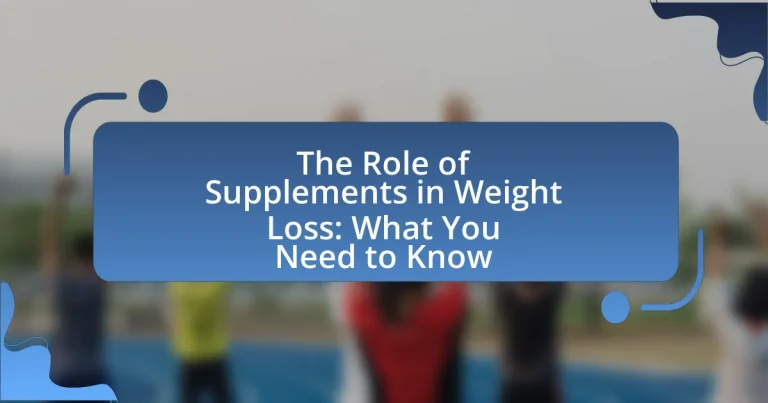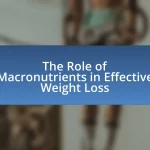The article examines the role of supplements in weight loss, highlighting their ability to enhance metabolic processes, reduce appetite, and improve nutrient intake. It discusses various types of supplements commonly used for weight loss, such as caffeine, green tea extract, and fiber supplements, and explains their mechanisms of action in the body. Additionally, the article addresses the potential benefits and risks associated with weight loss supplements, emphasizing the importance of safety, regulation, and individual health considerations. Best practices for integrating supplements into a weight loss strategy, including dietary changes and exercise, are also outlined to maximize effectiveness and achieve sustainable results.

What is the Role of Supplements in Weight Loss?
Supplements play a supportive role in weight loss by enhancing metabolic processes, reducing appetite, and improving nutrient intake. Certain supplements, such as green tea extract and caffeine, have been shown to boost metabolism and increase fat oxidation, which can aid in weight loss efforts. For instance, a study published in the American Journal of Clinical Nutrition found that green tea extract can increase energy expenditure and fat oxidation, contributing to weight loss. Additionally, fiber supplements can help control hunger by promoting a feeling of fullness, which may lead to reduced calorie intake. Overall, while supplements can assist in weight loss, they are most effective when combined with a balanced diet and regular exercise.
How do supplements contribute to weight loss?
Supplements contribute to weight loss primarily by enhancing metabolism, reducing appetite, and increasing fat oxidation. For instance, ingredients like caffeine and green tea extract have been shown to boost metabolic rate and promote fat burning. A study published in the American Journal of Clinical Nutrition found that caffeine can increase energy expenditure by 3-11%, leading to greater calorie burn. Additionally, fiber supplements can help control hunger by promoting a feeling of fullness, which may lead to reduced calorie intake. Research indicates that glucomannan, a type of soluble fiber, can significantly reduce body weight when taken before meals. Thus, specific supplements can effectively support weight loss efforts through these mechanisms.
What types of supplements are commonly used for weight loss?
Commonly used supplements for weight loss include caffeine, green tea extract, garcinia cambogia, and conjugated linoleic acid (CLA). Caffeine is known to boost metabolism and increase fat burning, while green tea extract contains catechins that enhance fat oxidation. Garcinia cambogia is believed to suppress appetite and inhibit fat production, and CLA is thought to reduce body fat by increasing metabolic rates. These supplements have been studied for their effects on weight loss, with various clinical trials supporting their efficacy in promoting fat loss and improving body composition.
How do these supplements work in the body?
Supplements work in the body by providing essential nutrients that may enhance metabolic processes, support fat oxidation, and regulate appetite. For instance, ingredients like caffeine can increase energy expenditure and fat burning, while fiber supplements can promote satiety, reducing overall calorie intake. Research indicates that certain supplements, such as green tea extract, can boost metabolism by 3-4% and enhance fat oxidation during exercise, as shown in a study published in the American Journal of Clinical Nutrition.
What are the potential benefits of using supplements for weight loss?
Using supplements for weight loss can enhance fat metabolism, suppress appetite, and improve energy levels. Certain supplements, such as green tea extract and caffeine, have been shown to increase metabolic rate and promote fat oxidation, leading to more effective weight loss. For instance, a study published in the American Journal of Clinical Nutrition found that green tea extract can boost metabolism by 3-4% over 24 hours. Additionally, supplements like glucomannan can help reduce appetite by expanding in the stomach, which may lead to lower calorie intake. These benefits can support individuals in achieving their weight loss goals more efficiently.
How can supplements enhance metabolism?
Supplements can enhance metabolism by providing essential nutrients that support metabolic processes and by containing compounds that may increase energy expenditure. For instance, ingredients like caffeine and green tea extract have been shown to boost metabolic rate by stimulating thermogenesis, which is the process of heat production in the body. A study published in the American Journal of Clinical Nutrition found that caffeine can increase metabolic rate by 3-11% for a few hours after consumption. Additionally, certain amino acids and vitamins, such as B vitamins, play crucial roles in energy metabolism, facilitating the conversion of food into energy. Thus, the right supplements can effectively support and enhance metabolic functions.
What role do supplements play in appetite suppression?
Supplements can play a significant role in appetite suppression by influencing hormones and neurotransmitters that regulate hunger. Certain ingredients, such as glucomannan, green tea extract, and 5-HTP, have been shown to promote feelings of fullness and reduce food intake. For instance, a study published in the journal “Obesity” found that glucomannan supplementation led to a reduction in body weight and appetite in overweight individuals. Additionally, green tea extract has been associated with increased fat oxidation and appetite reduction, as noted in research from the “American Journal of Clinical Nutrition.” These supplements can therefore assist individuals in managing their appetite, which may contribute to weight loss efforts.

What should you consider before using weight loss supplements?
Before using weight loss supplements, individuals should consider their safety, efficacy, and potential side effects. Research indicates that not all supplements are regulated by the FDA, which raises concerns about their quality and safety. For instance, a study published in the Journal of the American Medical Association found that many weight loss supplements contain unlisted ingredients that can be harmful. Additionally, understanding the ingredients and their mechanisms is crucial, as some may interact with medications or exacerbate health conditions. Therefore, consulting a healthcare professional before starting any supplement is essential to ensure it aligns with individual health needs and goals.
What are the risks associated with weight loss supplements?
Weight loss supplements carry several risks, including potential side effects, interactions with medications, and lack of regulation. Many supplements can cause adverse effects such as increased heart rate, high blood pressure, and gastrointestinal issues. For instance, products containing stimulants like caffeine or synephrine can lead to cardiovascular problems. Additionally, weight loss supplements may interact negatively with prescription medications, leading to harmful consequences. The lack of regulation by the FDA means that many supplements may not contain the ingredients listed on the label or may include harmful substances. A study published in the Journal of the American Medical Association found that nearly 20% of weight loss supplements contained undeclared ingredients, highlighting the risks associated with their use.
How can side effects impact your health?
Side effects can significantly impact your health by causing adverse reactions that may lead to complications or worsen existing conditions. For instance, certain weight loss supplements can induce side effects such as gastrointestinal issues, increased heart rate, or elevated blood pressure, which can compromise overall well-being. Research indicates that approximately 30% of individuals using dietary supplements experience side effects, highlighting the importance of monitoring these reactions closely. Therefore, understanding and managing side effects is crucial for maintaining health while using supplements for weight loss.
What should you know about supplement quality and regulation?
Supplement quality and regulation are critical factors in ensuring safety and efficacy for consumers. The U.S. Food and Drug Administration (FDA) does not approve dietary supplements before they reach the market, which means that manufacturers are responsible for ensuring their products are safe and accurately labeled. According to the Dietary Supplement Health and Education Act of 1994, supplements are classified as food products, not drugs, leading to less stringent regulations compared to pharmaceuticals. This lack of pre-market approval can result in variations in ingredient quality and potency, making it essential for consumers to look for third-party testing certifications, such as those from NSF International or the United States Pharmacopeia (USP), which verify that products meet specific quality standards.
How can you determine if a supplement is right for you?
To determine if a supplement is right for you, assess your individual health needs, dietary restrictions, and consult with a healthcare professional. Individual health needs vary; for instance, someone with a deficiency in a specific nutrient may benefit from a targeted supplement. Dietary restrictions, such as veganism or allergies, also influence supplement suitability, as some may contain animal products or allergens. Consulting with a healthcare professional ensures that the supplement aligns with your health goals and does not interact negatively with any medications or conditions. Research supports that personalized approaches to supplementation can lead to better health outcomes, as highlighted in studies published in journals like the “American Journal of Clinical Nutrition.”
What factors should you consider based on your health status?
When considering health status in relation to weight loss supplements, individuals should evaluate their medical history, current medications, and specific health conditions. Medical history can reveal pre-existing conditions such as diabetes or heart disease, which may influence the safety and efficacy of certain supplements. Current medications must be assessed to avoid harmful interactions; for instance, some weight loss supplements can interfere with blood pressure medications. Specific health conditions, like thyroid disorders, can also dictate which supplements are appropriate, as they may affect metabolism. Therefore, a comprehensive understanding of these factors is crucial for safe and effective weight loss supplement use.
How can you evaluate the effectiveness of a supplement?
To evaluate the effectiveness of a supplement, one should analyze clinical studies that demonstrate its impact on weight loss. Research published in the Journal of Obesity indicates that supplements containing ingredients like green tea extract and Garcinia cambogia can lead to measurable weight loss when combined with a balanced diet and exercise. Additionally, reviewing user testimonials and expert opinions can provide insights into the supplement’s efficacy. Regulatory approval from organizations such as the FDA can also serve as an indicator of safety and effectiveness, although it does not guarantee results.

What are the best practices for using supplements in a weight loss plan?
The best practices for using supplements in a weight loss plan include consulting a healthcare professional, selecting evidence-based supplements, and integrating them into a balanced diet and exercise regimen. Consulting a healthcare professional ensures that the chosen supplements are safe and appropriate for individual health conditions. Evidence-based supplements, such as those containing green tea extract or conjugated linoleic acid, have shown effectiveness in supporting weight loss in clinical studies. Additionally, supplements should complement a balanced diet rich in whole foods and regular physical activity, as relying solely on supplements without lifestyle changes is unlikely to yield sustainable weight loss results.
How should supplements be integrated into a weight loss strategy?
Supplements should be integrated into a weight loss strategy as complementary tools to enhance overall dietary and exercise efforts. Research indicates that certain supplements, such as protein powders, fiber supplements, and green tea extract, can support weight loss by increasing satiety, boosting metabolism, and aiding in fat oxidation. For instance, a study published in the “American Journal of Clinical Nutrition” found that protein supplementation can lead to greater weight loss and fat loss compared to a control group. Therefore, when used appropriately alongside a balanced diet and regular physical activity, supplements can effectively contribute to achieving weight loss goals.
What dietary changes should accompany supplement use?
Dietary changes that should accompany supplement use include increasing the intake of whole foods, such as fruits, vegetables, lean proteins, and whole grains, while reducing processed foods and added sugars. Whole foods provide essential nutrients that supplements may not fully replace, ensuring a balanced diet that supports weight loss and overall health. Research indicates that diets rich in whole foods can enhance the effectiveness of supplements, as they work synergistically to improve metabolic health and nutrient absorption. For instance, a study published in the Journal of Nutrition found that individuals who consumed a diet high in fruits and vegetables experienced greater weight loss when using dietary supplements compared to those who did not.
How important is exercise when using supplements for weight loss?
Exercise is crucial when using supplements for weight loss, as it enhances the effectiveness of these supplements and promotes overall health. Research indicates that combining exercise with dietary supplements can lead to greater fat loss and improved body composition compared to using supplements alone. A study published in the Journal of Obesity found that participants who engaged in regular physical activity while taking weight loss supplements experienced a 20% greater reduction in body fat compared to those who relied solely on supplements. Therefore, integrating exercise into a weight loss regimen that includes supplements is essential for maximizing results and achieving sustainable weight loss.
What tips can help maximize the effectiveness of weight loss supplements?
To maximize the effectiveness of weight loss supplements, individuals should combine their use with a balanced diet and regular exercise. Research indicates that supplements are most effective when integrated into a comprehensive weight loss plan, as they can enhance metabolism and reduce appetite but do not replace the need for healthy lifestyle choices. For instance, a study published in the Journal of Obesity found that participants who combined supplements with dietary changes and physical activity lost significantly more weight than those who relied solely on supplements. Additionally, staying hydrated and following the recommended dosages can further enhance the results of weight loss supplements.
How can you track your progress effectively?
To track your progress effectively in weight loss, utilize a combination of regular measurements, food diaries, and progress photos. Regularly measuring body weight, body fat percentage, and waist circumference provides quantitative data on your physical changes. Keeping a food diary helps you monitor caloric intake and nutrient balance, which is crucial when using supplements. Progress photos taken at consistent intervals visually document changes in body composition. Research indicates that individuals who track their progress are more likely to achieve their weight loss goals, as evidenced by a study published in the American Journal of Preventive Medicine, which found that self-monitoring significantly correlates with successful weight management outcomes.
What common mistakes should you avoid when using supplements?
Common mistakes to avoid when using supplements include not consulting a healthcare professional, taking excessive dosages, relying solely on supplements for weight loss, and ignoring potential interactions with medications. Consulting a healthcare professional ensures that the chosen supplements are appropriate for individual health needs and conditions. Taking excessive dosages can lead to adverse effects; for example, high doses of fat-soluble vitamins can accumulate in the body and cause toxicity. Relying solely on supplements neglects the importance of a balanced diet and exercise, which are crucial for effective weight loss. Lastly, ignoring potential interactions can result in harmful side effects; for instance, certain supplements may interfere with prescription medications, reducing their effectiveness or increasing side effects.


